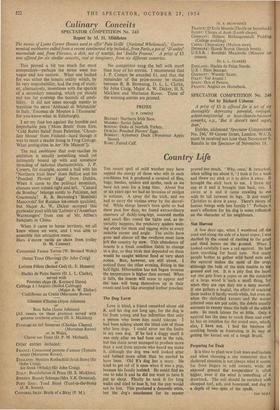Country Life
THE recent spell of mild weather may have sapped the energy of those who wilt in such conditions but it produced a carnival of flies, bugs, beetles, spiders and moths, such as we have not seen for a long time. About five or six years ago we had an invasion of midges in autumn. A spray did the trick, and we had to carry the victims away by the shovel- ful. While things haven't been quite so bad these past few days, we found extraordinary numbers of daddy-long-legs, assorted moths and small flies round the lights and, as in- variably happens, the predatory spiders wait- ing about for them and rigging wchs at every suitable corner and angle. The swifts have gone and almost all the swallows must have left the country by now. This abundance of insects is a freak condition liable to change in a day, so that birds that depended on them would be caught without food at very short notice. Bats, however, are still about. I noticed them the other evening, flitting in the half-light. Hibernation has not begun because the temperature is higher than normal. When it falls, the insects will cease to appear and the bats will hang themselves up in their roosts and look like crumpled leather pouches.
The Dog Lover
Love is blind, a friend remarked about old R. and his dog not long ago, for the dog is far from young and has infirmities that only a person who loves him could tolerate. I had been talking about the blind side of those who love dogs. I could never see the faults in my own dog. If ho had a doggy smell it was only after we had been out in the rain, but this claim never managed to produce more than a nod from anyone who heard me make it, although the dog was well looked after and bathed more often than he needed to have been. Old R's dog has a story. Ho tried to get rid of it once when it was a pup, because his family insisted. He could find no one to take it and ho did not want to have it put to sleep. Finally he took it for long walks and tried to lose it, but the pup would not be lost. This produced a domestic crisis, but the dog's attachment for its master proved too much. Why, once,' R. remarked, when telling me about it, ' I took it for a walk and threw my stick at it to drive it away. It brought the stick back to me. I threw my cap at it and it brought that back, too. I swore at it and it came crawling to me with its tail between its legs. It just wasn't Christian to drive it away. There's plenty of human beings with less loyalty ! ' Perhaps a man's affection for his dog is some reflection on the character of his neighbours.
Not Harvest
A few days ago, when I wandered off the road and along the side of a hazel copse, I was startled by the sound of rustling in the grasS and dead leaves on the ground. When I looked carefully I saw a red squirrel. He ha been searching for hazel nuts. Not many people bother to gather wild hazel nuts and the squirrel makes the most of the crop, although the bulk of the nuts tumble to the ground and rot. It is a pity that the hazel nut one gets from a copse or on the outskirts of a large wood is 'such a small thing, for when they are ripe they arc a tasty morsel. If one gathers a bagful, the effort of cracking them makes it hardly worth while, but even so, when the shrivelled kernels and the worm• infected ones are put aside, the debris usually amounts to twenty times the bulk of the edible nuts. So much labour for se little. Only a squirrel has the time to crack them and even he has an intuition for the sound ones, which, alas, I have not. I find the business of cracking hazels as frustrating in its way as getting the kernel out of a tough Brazil.
Preparing for Fruit


































 Previous page
Previous page